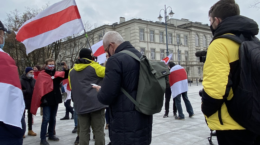On April 4, 2023, the Seimas of Lithuania passed the bill № XIV-1868 of the Republic of Lithuania about restrictive measures related to military aggression against Ukraine aimed at providing national security and foreign policy interests of the Republic of Lithuania.
On April 20, 2023, the Seimas of the Republic of Lithuania was supposed to vote and decide whether it agrees with the veto of the President Gitanas Nausėda who demanded to tighten the residence rules for Belarusians in Lithuania or passes the bill Nr. XIV-1868, nicknamed by the people as “Kasčiūnas’s law” (Laurynas Kasčiūnas – the Chairman of National Security and Defense Committee of Lithuanian Parliament) in the version the deputes voted for in April 4, 2023.
Chronology of the events on the day of April 20, 2023:
09.19 a.m. – a publication on the Telegram channel “Parliamentary channel” held by Anatoli Liabedzka, a councelor of Sviatlana Tsikhanouskaya, was posted with a communication that the deputies of the Seimas received mass mails from Our House and Dapamoga containing threats, and that the fact was “a vivid example of a job done wrong” as one should not give an “ultimatum”.
10.20 a.m. – Dapamoga communicated to Anatoli Liabedzka that neither Dapamoga nor Our House had sent any mails to the Seimas’s deputies; the publication after some time was deleted, but apologies for spreading a fake information have never arrived.
11.00 a.m. – Failure of the Seimas Conference Rooms System did not allow to start the planned session and voting on the bill on time.
12.16 p.m. – Our House issued an official denial on all its social media of the statement saying the Our House had never made any mass mailing with threats to the Seimas’s deputies and demanded from the “Parliamentary channel” to stop spreading fake information.
12.30 p.m. – a communication arrived saying that the the Seimas Conference Rooms System was restored.
1.30 p.m. – an assembly of the fractions leaders was held, a revised agenda for the afternoon session was adopted, the voting on the bill was postponed till 4.30 p.m.
4.00 p.m. – (four hours after the issue of the official denial) Sviatlana Tsikhanouskaya’s affiliated media simultaneously and massively started spreading fake information “Karach is threatening the deputies of the Seimas”.
Nasha Niva issued an article “Karach has sent out letters to Lithuanian deputies. Some saw that as a threat”.

The article of Nasha Niva started being massively reposted in every chat making part of InfoPoint, controlled by Franak Viačorka, another councelor of Sviatlana Tsikhanouskaya, including “Belarus Golovnogo Mozga”, the chat “Belarusians of Vilnius” and many others.



The blogger Anton Matolka wrote a post on the topic “Why is Karach so dumb and behaves like the KGB of Belarus wants her to?”


The editor of Euroradio Yauhen Kazartsau calls Olga Karach on Twitter a “bold hussy” and outrages by asking “does Olga Karach has a right to blackmail the leadership of Lithuania?”

Other Sviatlana Tsikhanouskaya’s affiliated bloggers were noted to publish similar posts.
4.30 p.m. – the deputies of the Seimas started discussing the bill and voting for it.
5.21 p.m. – the Seimas of Lithuania passed the bill with amendments and overrode the president Nausėda’s veto.
After the attempt to worsen the situation of Belarusians in Lithuania through a provocation had failed:
5.30 p.m. – Sviatlana Tsikhanouskaya’s affiliated media feverishly start cleaning up posts and articles: among them, Nasha Niva quickly deleted the article “Karach has sent out letters to Lithuanian deputies. Some saw that as a threat”.

7.35 p.m. – new article appears on Nasha Niva with the title “Mass mailing on behalf of Our House to Lithuanian deputies was someone’s special operation”.
Until now, not even one Sviatlana Tsikhanouskaya’s sturctural affiliated media or Telegram channel has apologized for deliberate spreading of fake news.
It is obvious that the fake mass mailing with threats to the deputies of the Lithuanian Seimas had only one purpose: to worsen the situation of Belarusians in Lithuania, to quarel Lithuanian politicians and the Belarusian diaspora and to discredit Belarusian organizations working with Belarusian refugees. Somebody wanted very much to have an external impact on the voting results and harm Belarusians in Lithuania.
In that story only one unanswered question remains.
If Sviatlana Tsikhanouskaya’s structures have nothing to do with this provocation, then how can they explain the massive and deliberate spreading of fake news before the voting four hours after the publication of the official denial and one hour prior to the beginning of the deputies’ vote on the bill in question?










